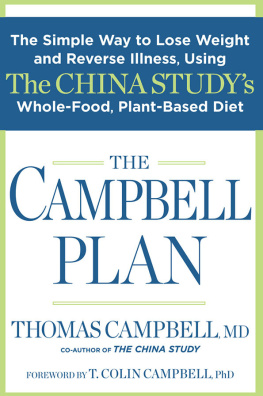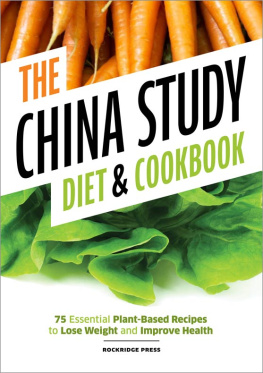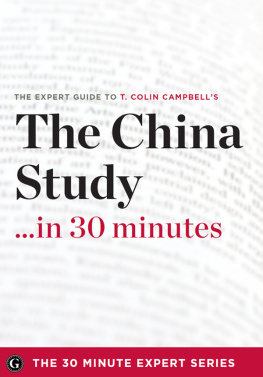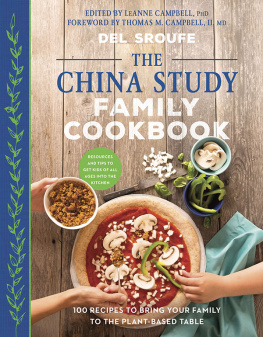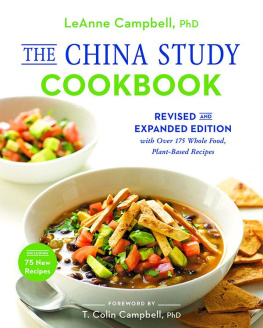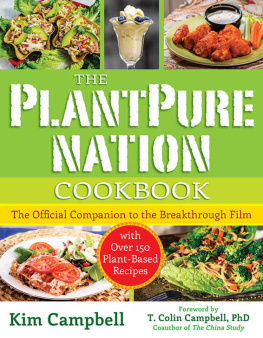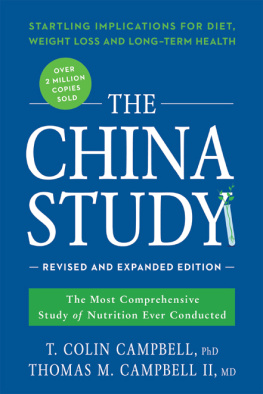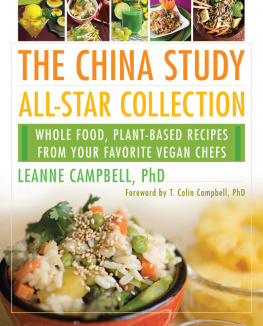PRAISE FOR THE CAMPBELL PLAN
With this most worthy companion book to The China Study, Dr. Thomas Campbell is once again a superb guide on our journey to optimum health. What will strike the reader most is Dr. Campbells admirable balance between confidence and humility. When hes not yet sure, he tells us why. When he is sure, he not only explains why, but also shows us how. Dont miss it.
Douglas J. Lisle, PhD, coauthor of The Pleasure Trap
The Campbell Plan is a terrific adjunct to The China Study and will ensure that your path toward better health is not only easy but truly enjoyable!
Alona Pulde, MD, and Matthew Lederman, MD, authors of The Forks Over Knives Plan and founders of Transition to Health Center
The Campbell Plan is a clear, concise, and thorough strategy for anyone who wants to take their health to the moon following the principles of a whole-foods, plant-based diet. Who better to guide the way than Dr. Tom Campbell!!
Rip Esselstyn, #1 New York Times bestselling author of The Engine 2 Diet and My Beef with Meat
Dr. Tom Campbell expertly and creatively blends evidence-based recommendations and practical information in The Campbell Plan. I urge you to read this book to put the remarkable benefits of building your meals from fruits, vegetables, grains, and legumes into action. Your body (and doctor) will applaud you.
Amy Joy Lanou, PhD, chair and associate professor, Department of Health and Wellness, University of North Carolina, Asheville
The groundbreaking research of the original China Study helped usher in a revolution in thinking; today, the global scientific community recognizes the clear connection between healthy diets and lower risk for many cancers.
Marilyn Gentry, president, World Cancer Research Fund International
I was thrilled to read Dr. Tom Campbells new book, The Campbell Plan, which transforms the scientific insights of his previous groundbreaking book, The China Study, into an easy-to-understand-and-apply approach to getting and staying healthy! This book will be mandatory reading for all of our patients.
Alan Goldhamer, DC, director, TrueNorth Health Center, Santa Monica, California
Reading The Campbell Plan puts you in the presence of a caring, experienced family physician who powerfully reveals the Standard American Diet as the chief culprit in our major disease epidemics: obesity, diabetes, high blood pressure, heart attack and stroke, and many cancers and autoimmune diseases. This is one doctors appointment you will enjoyand benefit from all your life. Highly recommended!
Michael Klaper, MD, staff physician, TrueNorth Health Center, Santa Monica, California
As the evidence on smoking and health became clear in the 1960s, doctors led the way by quitting smoking in record numbers. Over time its become a standard of care to advise smokers to quit. As the evidence on a whole-food plant-based diet accumulates, more and more doctors and health-care providers will improve their diets and help their patients to do so as well. This book is a breath of fresh air.
Gary A. Giovino, PhD, MS, professor and chair, Department of Community Health and Health Behavior, University at Buffalo, SUNY
This book is a wonderful and helpful sequel to The China Study. Tom Campbell summarizes the research demonstrating the health benefits of a whole-food, plant-based diet (why we should change our diet) and then provides very practical advice on how to adopt such a diet, even including menu plans, recipes, and shopping lists. I highly recommend The Campbell Plan to health professionals, patients, and the general public.
Thomas L. Campbell, MD, chair, Department of Family Medicine, University of Rochester School of Medicine (no relation to the author)
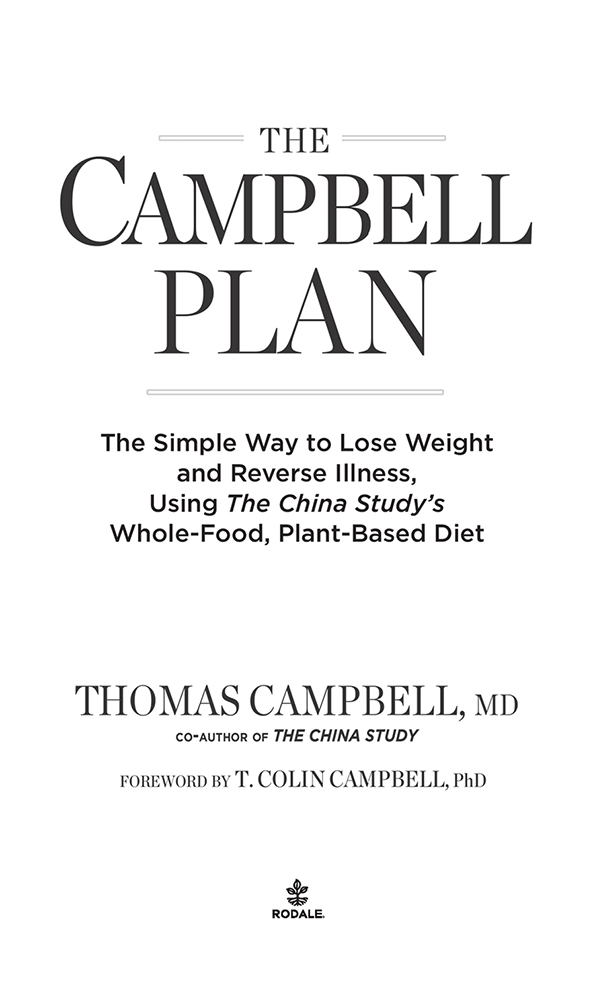
For Erin, my favorite;
For Mom and Dad, the kindest revolutionaries Ive ever known;
And for the patients everywhere looking to take control of their health
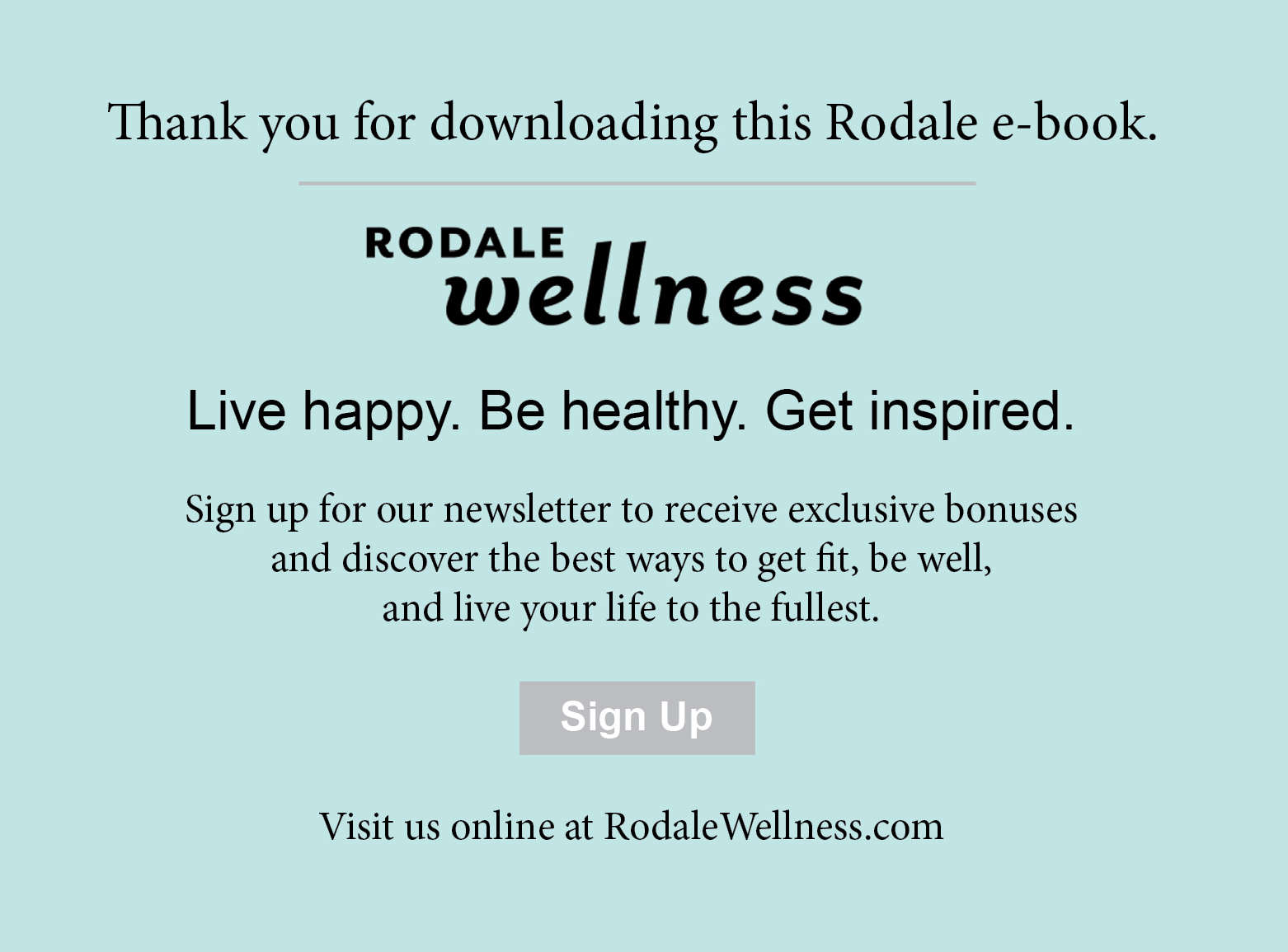
CONTENTS
FOREWORD
I ve presented hundreds of diet and health lectures over the last 20 to 30 years, mostly concerning the exceptional health benefits of a whole-food, plant-based (WFPB) dietary lifestyle. The world of diet and health is littered with claims and counterclaims, but a tipping point for the WFPB idea is beginning to peer above the din. Interest in this extraordinary way of achieving health is gaining unprecedented momentum. Many are wondering why they have not heard this before, while others are anxious to get started, wanting to know how best to do it. As this interest grows, questions naturally arise about the supporting evidence, in part because this idea challenges long-held, almost sacred assumptions and practices.
It is extremely important, therefore, that discussion of this evidence be articulated in a way that is, first and foremost, true to its scientific foundation. The evidence is both compelling and promising because it points a way to resolve a broad range of difficult societal problems. These problems are complex, collectively defining the human condition, both private and public. As much as any other consideration, and perhaps surprising to many, deciding what to eat goes a long way toward solving these problems. If this dietary lifestyle is done right, it means maintaining and restoring personal health, minimizing health care costs, preventing environmental degradation, limiting unnecessary violence, and reconfiguring a badly distorted food production economy. Because the root causes of these seemingly diverse problems converge on our food choices, it is paramount to ask what is the evidence for this dietary practice and how is it obtained, understood, and used?
Tom Campbell, MD, my son, is unusually prepared to tackle this question. Trained in arts and communicationtheater arts was his major at Cornell Universityhe joined me in coauthoring The China Study, bringing with him skills that made our book unusually readable and, ultimately, eminently successful. That experience and the exceptionally promising evidence for this dietary lifestyle prompted him to seek a career in medicine, eventually leading to board certification in family medicine. His training in medicine, his in-depth knowledge of nutrition, and, along the way, his experience with patients in his clinic provide an unusually good combination to consider this evidence in a way that works, both for his patients and for his colleagues.
Getting the evidence right especially requires tackling the difficult issues, which generate a marketplace presence and a lot of public discussion but oftentimes with little or no supporting science. I have in mind issues like omega-3 fats (supplements versus foods?), low-carb diets (what kind of carbs?), gluten sensitivity (how many people need to care?), fish oil (same as whole fish? or none at all?), wheat and other cereals (good for fat bellies or a source of good fiber?), organic foods (good nutrients or bad chemicals?), and GMO foods (a promise of social good or human health risk?) among others. These are the kinds of topics that Tom clarifies using sound scientific justification.
Aside from his medical practice and his faculty association with the University of Rochester Medical School, Tom also is the executive director of our nonprofit Center for Nutrition Studies and its growing suite of online courses, offered in partnership with the nationally ranked Cornell University online program. Having coauthored
Next page
